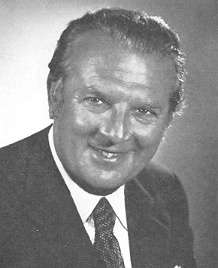Mario Zagari
| Mario Zagari | |
|---|---|
 | |
| Minister of Justice | |
|
In office 7 July 1973 – 23 November 1974 | |
| Minister of Commerce | |
| Personal details | |
| Born |
14 September 1913 Milano |
| Died |
29 February 1996 (aged 82) Rome |
| Resting place | Protestant Cemetery, Rome |
| Nationality | Italian |
| Political party | Italian Socialist Party |
| Alma mater | University of Milan |
Mario Zagari (born 14 September 1913 – 29 February 1996) was an Italian socialist politician, who served in the Italian parliament and in the European parliament as well as in the Italian governments in various capacities.
Early life and education
Zagari was born in Milano on 14 September 1913.[1] He held a law degree, which he received from the University of Milan.[2] He attended courses of political economy at the University of Berlin.[2]
During World War II, he was an anti-Nazi resistance militant.[3]
Career
After the war Zagari began his political activity. He was leader of the anti-Stalinist group, called Iniziativa Socialista.[4] He became a member of the Socialist Party on 18 July 1952.[1] He remained as a member of the party until 24 July 1989.[1] He served as the undersecretary at the ministry of foreign affairs for three times (specifically, from 23 February 1966 to 5 June 1968, from 22 July 1964 to 21 January 1966 and from 12 December 1968 to 5 July 1969).[5][6]
At the beginning of the 1970s Zagari served as the minister of commerce and led the first Italian commercial delegation to China in 1971.[7] He was the justice minister from 7 July 1973 to 23 November 1974. Then he became one of twelve vice president of the European parliament on 27 October 1976 and held the post until 18 January 1982.[1][8] He was part of the socialist group in the parliament.[8] He ran for the presidency of the parliament in the elections held in July 1979, but lost the election.[9] In addition, he served at different commissions and delegations of the parliament from 14 March 1978 to 24 July 1989.[1]
Controversy
After leaving office as justice minister Zagari was charged with abusing official acts, and making them public.[10] The inquiry committee of the parliament, whose twenty members had been selected in proportion to the membership of the parties, rejected the case with a majority vote.[10]
Death and legacy
Zagari died in Rome on 29 February 1996.[2] He was buried in the Protestant Cemetery in Rome.[11] On the tenth anniversary of his death a book by him and Giuseppe Muzzi was republished in 2006.[12]
References
- 1 2 3 4 5 "Mario Zagari". European Parliament. Retrieved 24 April 2013.
- 1 2 3 "Mario Zagari (1913-1996)". Fondazione Turati. Retrieved 24 April 2013.
- ↑ "European parliament launched". Bangor Daily News. Strasbourg. 18 July 1979. Retrieved 24 April 2013.
- ↑ Paul Ginsborg (1 January 2003). A History of Contemporary Italy: Society and Politics, 1943-1988. Palgrave Macmillan. p. 104. ISBN 978-1-4039-6153-2. Retrieved 25 April 2013.
- ↑ "Past ministers". Ministry of Foreign Affairs. Retrieved 24 April 2013.
- ↑ Calandri, Elena (2003). "Italy's Foreign Assistance Policy, 1959–1969" (PDF). Contemporary European History. 12 (4): 509–523. doi:10.1017/s0960777303001395. Retrieved 24 April 2013.
- ↑ "Former Italian Ambassador to China Speaks Out". Alberto Forchielli blog. 22 June 2012. Retrieved 24 April 2013.
- 1 2 GSPE European University Institution. Retrieved 23 December 2013.
- ↑ "Simone Veil is First Elected Head of the European Parliament". Jewish News Archive (JTA). 19 July 1979.
- 1 2 Franco Ferraresi (1996). Threats to Democracy. Princeton, NJ: Princeton University Press. p. 241. Retrieved 2 September 2013. – via Questia (subscription required)
- ↑ "About the Protestant Cemetery web site". Protestant Cemetery. Retrieved 23 December 2013.
- ↑ "Mario Zagari e l'Europa: scritti e discorsi, 1948-1993". WorldCat. Retrieved 23 December 2013.